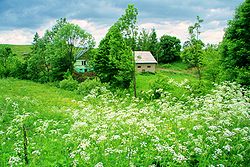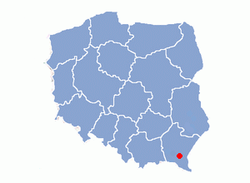Tokarnia, Sanok County: Difference between revisions
m Sp |
|||
| Line 57: | Line 57: | ||
==References== |
==References== |
||
{{reflist|colwidth=30em}} |
{{reflist|colwidth=30em}} |
||
The village of Tokarnia was completely wiped put by Polish Partisans in 1945 or 1946, every man, woman, and child were executed. Today this part of Ukrainian ethnographic territory in the Beskyd Mountains, part of the Carpathians, Lemkivshchyna as it is known in Ukrainian is part of Poland. |
The village of Tokarnia was completely wiped put by Polish Partisans in 1945 or 1946, every man, woman, and child were executed. Today this part of Ukrainian ethnographic territory in the Beskyd Mountains, part of the Carpathians, Lemkivshchyna as it is known in Ukrainian is part of Poland. Reverend Myola Charischak's testimony. |
||
Oksana's mother Maria nee Padoch (the ch is pronounced kh as in the name Khmel’nyts’kyi) and Father Mykola Charischak were schoolteachers in Tokarnia. Maria nee Padoch, Oksana’s mother was a very devout Christian. She suffered a nervous breakdown when Oksana was born and this affected her disposition throughout her life. The cause of the breakdown was seeing German Gestapo bash the heads of little children against the ground, walls or any other hard objects. Tokarnia was ethnically destroyed by the Polish |
Oksana's mother Maria nee Padoch (the ch is pronounced kh as in the name Khmel’nyts’kyi) and Father Mykola Charischak were schoolteachers in Tokarnia. Maria nee Padoch, Oksana’s mother was a very devout Christian. She suffered a nervous breakdown when Oksana was born and this affected her disposition throughout her life. The cause of the breakdown was seeing German Gestapo bash the heads of little children against the ground, walls or any other hard objects. Tokarnia was ethnically destroyed by the Polish |
||
Revision as of 09:19, 1 June 2017
Tokarnia
Токарня | |
|---|---|
Village | |
 View of houses in Tokarnia Village | |
 | |
| Coordinates: 49°27′58″N 22°01′25″E / 49.4661997°N 22.0236826°E | |
| Country | Poland |
| Voivodship | Subcarpathian Voivodship |
| Founded | 1526 |
| Area | |
• Total | 4.8 km2 (1.9 sq mi) |
| Elevation | 270 m (890 ft) |
| Population | |
• Total | 200 |
| Time zone | UTC+1 (CET) |
| • Summer (DST) | UTC+2 (CEST) |
| Postal code | 38-500 |
Tokarnia [tɔˈkarɲa] (Template:Lang-uk, Tokarnia), village in East Małopolska in the Lesser Beskid mountains, Bukowsko rural commune. Tokarnia is about 10 miles (16 kilometres) from Sanok in south-eastern Poland. It is situated below the main watershed at the foot of the Słonne Mountain, and has an elevation of 270 metres (890 ft). It is in the Subcarpathian Voivodship (since 1999), previously in Krosno Voivodship (1975–1998) and Sanok district.
History

Tokarnia was founded in 1526 by Herburt. From 1340-1772 (Ruthenian Voivodeship) and from 1918-1939 Tokarnia was part of Poland. While during 1772-1918 it belonged to Austrian empire, later Austrian-Hungarian empire when double monarchy was introduced in Austria. This part of Poland was controlled by Austria for almost 120 years. At that time the area (including west and east of Subcarpathian Voivodship) was known as Galicia.

The rural families are poor, agriculture is rarely profitable and low income makes it difficult for farms to invest in from improvements.
Religion
In Tokarnia there used to be a Greek Catholic parish church, the church of St. Michael the Archangel (formerly called the church of The Most Blessed Virgin Mary). The wooden church was built and blessed in 1785. In this year the parish had a congregation of 280 Greek Catholics, which went up to 612 by 1936. The church was destroyed in 1946 by the UPA.[1]
The Roman Catholic parish for Tokarnia was located in Bukowsko. It's diocesan was located in Przemyśl. The Roman Catholic Archdiocesan Archives in Przemyśl has some records for Tokarnia, however they are of a different time period.
Most popular surnames in the region
- Surnames (19th) : Bierówka, Celep, Dewerenda, Dyrcz, Falter, Hołak, Luberda, Leszanty, Misko, Mirek, Makara, Makawa, Janicki, Kuncio, Korabik, Kril, Konik, Kuryl, Kuryło, Padubiński, Ostafi, Pańko, Piszczatyn, Podwapiński, Roman, Romaniak, Sadowski, Szpynda, Śliz, Szczerba, Szponda, Szuszko (or Suszko), Tais, Tauftar, Tylawski, Wutzke.
Literature
- Adam Fastnacht, Nagórzany [in:] Slownik Historyczno-Geograficzny Ziemi Sanockiej w Średniowieczu (Historic-Geographic Dictionary of the Sanok District in the Middle Ages), Kraków, (II edition 2002), ISBN 83-88385-14-3.
- Jerzy Zuba "W Gminie Bukowsko". Roksana, 2004, ISBN 83-7343-150-0. Translated by Deborah Greenlee. Arlington, TX 76016.
International Relations
Twin towns
Tokarnia is twinned with:
References
The village of Tokarnia was completely wiped put by Polish Partisans in 1945 or 1946, every man, woman, and child were executed. Today this part of Ukrainian ethnographic territory in the Beskyd Mountains, part of the Carpathians, Lemkivshchyna as it is known in Ukrainian is part of Poland. Reverend Myola Charischak's testimony.
Oksana's mother Maria nee Padoch (the ch is pronounced kh as in the name Khmel’nyts’kyi) and Father Mykola Charischak were schoolteachers in Tokarnia. Maria nee Padoch, Oksana’s mother was a very devout Christian. She suffered a nervous breakdown when Oksana was born and this affected her disposition throughout her life. The cause of the breakdown was seeing German Gestapo bash the heads of little children against the ground, walls or any other hard objects. Tokarnia was ethnically destroyed by the Polish
Mykola converted to Orthodoxy to marry Oksana’s mother. Father Mykola and Maria were married on November 24, 1941, in the Ukrainian Orthodox Church of St. Mykolay, in the village of Lypovec’ (Lipowiec), in the Krosno povit (formerly Sanik). Father Ivan Zdanevych performed the nuptials. Please note that povit is an administrative unit, for example, such as a county.
After they married, Father Mykola and Maria both taught school in the village of Tokarnia, until he was ordained as an Orthodox priest in December 1942 in Kholm (Chelm) by Metropolitan Iliarion (Hilarion) Ohienko. The village of Tokarnia was completely wiped put by Polish Partisans in 1945 or 1946, every man, woman and child were executed. Today this part of Ukrainian ethnographic territory in the Beskyd mountains, part of the Carpathians, Lemkivshchyna as it is known in Ukrainian is part of Poland.
In 1942 after Oksana was born, the Charischak family moved from Tokarnia to the village of Terebin’, near Hrubeshiv, in the Kholm region where Father Mykola’s first Ukrainian Orthodox parish was located. The Family experienced all the atrocities of partisan warfare. The Bishop moved the family to a more secure village of Hrubeshiv, Lublin voyevidstvo (a Polish State), in the Kholm region, where he served both parishes until April 1944 when Polish Partisans burned the village down. They were fortunate to survive the Polish Partisan’s ethnic cleansing of the Ukrainian population in the region. Lublin was the farthest east that the Halych’ko-Volhyns’kyi Principality (Rus’/Ukrainian) extended.
After Hrubeshiv the family moved to the village of Radev near Balyhorod (Baligrod) in Lemkivshchyna on the Slovak border where Maria got a job as a schoolteacher. This area is on the Slovak border where the Ukrainian Insurgent Army reigned supreme until the early 1950’s. The Ukrainian Insurgent Army was the only major organized military formation in World War II to fight both evil forces in the world at that time, the Communist Russian Imperialists and the Nazi German Imperialists.
Radev is a village located near Tisna (Tysna), Koman’cha, Medzilaborce, Lupkiv, Lupkiv Pass, Solynka, and Rus’ke all Lemko villages located in the wildest area of the Beskyd. All these villages are situated around Mt. Volosan. This part of the Beskyd is best described by a Ukrainian as “tam de Did’ko kazhe dobranitch” << where the devil says good night>>.
External links
- Geographical Dictionary of the Kingdom of Poland and other Slavic Lands Słownik geograficzny Królestwa Polskiego i innych krajów słowiańskich. Warszawa. 1876. (digital edition)

